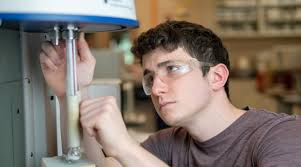Ph.D. in Ceramic Engineering: Introduction, Admission, Registration, Eligibility, Duration, Fees, Syllabus 2024

Introduction:
The Ph.D. in Ceramic Engineering offers a transformative journey into the realm of advanced materials science, focusing on the synthesis, processing, characterization, and application of ceramic materials. This specialized program provides an immersive research experience where students delve into the fundamental principles of ceramic engineering, exploring innovative solutions to real-world challenges in industries ranging from electronics and aerospace to healthcare and energy. Through rigorous coursework, hands-on laboratory experiments, and collaborative projects, students gain deep insights into the unique properties and potential applications of ceramics, preparing them for impactful careers as leaders in materials innovation.
Admission Process:
- Complete an online application, including submission of academic transcripts, statement of purpose, and letters of recommendation.
- Showcase proficiency in relevant fields such as materials science, engineering, chemistry, or physics.
- Participate in interviews with faculty members to discuss research interests, academic background, and potential contributions to the field.
Eligibility:
- Bachelor's or master's degree in materials science, ceramics, chemical engineering, mechanical engineering, or related fields.
- Strong academic record with coursework in materials science, chemistry, physics, and engineering.
- Research experience or demonstrated interest in ceramic materials through internships, projects, or publications.
Completion Time:
The completion time for a Ph.D. in Ceramic Engineering typically spans between 4 to 6 years, reflecting the depth and breadth of research required for advanced study in this field. This timeframe allows students to engage in comprehensive coursework, conduct in-depth research, and develop a dissertation that contributes new insights to the discipline.
During the initial phase of the program, students immerse themselves in advanced coursework tailored to their research interests and career goals. They delve into topics such as ceramic materials synthesis, processing techniques, structural characterization, and advanced manufacturing processes. This foundational coursework equips students with the knowledge and skills necessary to pursue independent research in ceramic engineering.
As students progress through the program, they transition to the research phase, where they work closely with faculty mentors to define and execute a research project that addresses critical challenges in ceramic engineering. This phase involves conducting experiments, analyzing data, and disseminating findings through publications and presentations.
The completion time may vary depending on factors such as the complexity of the research project, availability of resources, and individual student progress. Additionally, students may encounter unforeseen challenges or opportunities that impact their timeline.
Upon successful completion of all program requirements, including coursework, comprehensive exams, dissertation research, and defense, students are awarded their Ph.D. in Ceramic Engineering. This milestone marks the culmination of their academic journey and signifies their readiness to make significant contributions to the field of ceramic engineering through research, innovation, and leadership.
Career Opportunities:
- Academic faculty positions at universities or research institutions.
- Research and development roles in industries such as electronics, aerospace, healthcare, energy, and manufacturing.
- Consulting opportunities in materials engineering, process optimization, and product development.
- Entrepreneurial ventures in ceramics-based startups or technology transfer.
Syllabus:
- Advanced Ceramic Materials
- Ceramic Processing Techniques
- Structural Characterization of Ceramics
- Ceramic Coatings and Thin Films
- Ceramic Composite Materials
- Advanced Ceramic Manufacturing Processes
- High-Temperature Materials Behavior
- Research Seminar in Ceramic Engineering
Internship Opportunities:
- Collaborate with industry partners on ceramic materials research and development projects.
- Intern at research laboratories or manufacturing facilities specializing in ceramics production.
- Gain hands-on experience in ceramic processing, characterization, and testing through internships with leading companies or research institutions.
Scholarship and Grants:
- Graduate research assistantships providing stipends and tuition waivers.
- Fellowships from government agencies, private foundations, or industry sponsors supporting ceramic materials research.
- Travel grants to attend conferences and present research findings.
- Institutional scholarships and awards recognizing academic excellence and research potential.
FAQs:
What research areas are covered in the Ph.D. in Ceramic Engineering program?
The program covers various research areas, including ceramic materials synthesis, processing, characterization, properties, and applications in industries such as electronics, aerospace, healthcare, and energy.
Can students without a background in ceramics apply to the program?
Yes, students from diverse academic backgrounds, including materials science, chemistry, physics, and engineering, are encouraged to apply. However, a strong interest in ceramics and relevant coursework or research experience is recommended.
Are there opportunities for international students to apply for the program?
Yes, international students are welcome to apply. The program encourages diversity and welcomes applicants from around the world. International applicants should review specific application requirements for international students and English proficiency standards.
How does the program support students in securing internships or research opportunities?
The program offers career development services, connects students with industry partners, and facilitates networking opportunities with alumni and professionals in the field. Faculty mentors also provide guidance and support in identifying internship or research opportunities aligned with students' interests and career goals.
